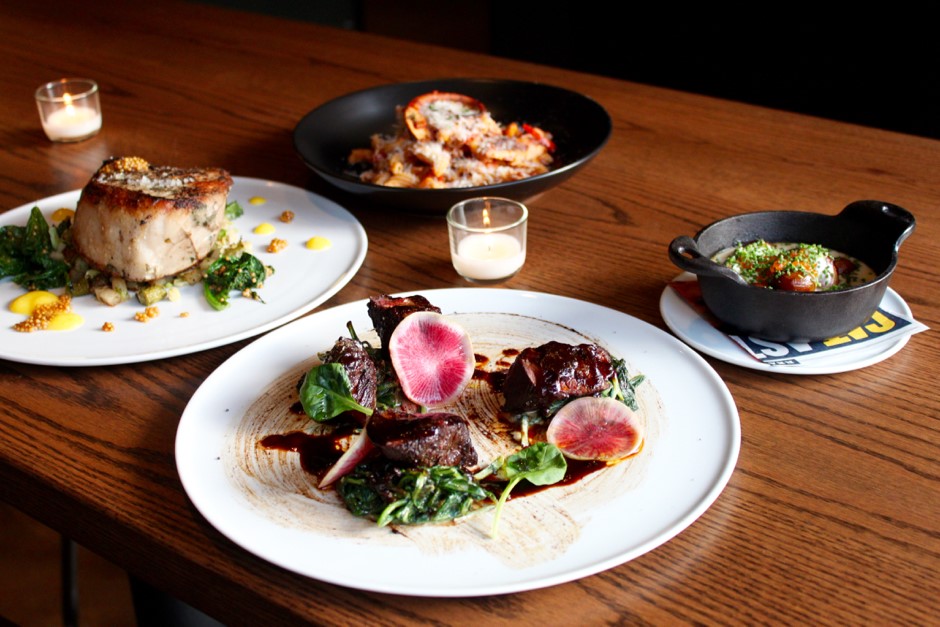Checking In On Rarest: From CNBC To Chestnut Street
So here’s the pitch: a restaurant where everything on the menu is raw, but not in a Los Angeles way. Instead, the restaurant would offer a menu of mostly raw and lightly cooked items: selected salumi, tartare, definitely some crudo, cevice, and vegetables, too. And then, on top of that, some stuff that’s definitely cooked. Like, you know, pork chops. Or french fries.
While the details of restaurant concept generation typically happen long before the public is invited to the party, food TV fans got to watch the idea for this restaurant, called Rarest, take shape in an episode of CNBC’s Restaurant Startup. And now, they can visit chef Anthony Marini and Chris Gaskill’s concept realized–with the help of a significant investment from Joe Bastianich, and in partnership with Stephen Finley and Thomas Finley of Finley Catering, on the corner of Eighth and Chestnut.
Originally from Philadelphia, Marini is a CIA grad who cooked in Philly at the Philadelphia Fish Company and Cork before heading south in 2003, just as Philly’s dining renaissance was beginning. He decamped for Birmingham, Alabama, where, he owned two successful restaurants, AMBA, and (local)–the latter of which was rated a Best new Restaurant by the Birmingham Weekly.

With Rarest, Marini has returned home. And while the core concept of the restaurant doesn’t exactly remain true to the name (there’s an awful lot of cooked stuff on the menu for a place called Rarest), there is still crudo–or as Marini is labeling it, “naked crudo.” It’s pretty, plated in a big, flat scallop shell and topped with a delicate julienne of lemon zest, scallion, and watermelon radish. A little pepper, a hit of olive oil, and it arrives, shining shingles of the fish of the day, beautifully presented. There’s also a classic beef tartare, this one made with hanger steak, studded with capers and crowned with a marigold yellow yolk. These are the plates where the raw angle really works, as one might imagine it also would with a shaved brussels sprout salad with pecorino, anchovy dressing, and rye; or in any one of the small but mighty salumi selection.
The menu then continues on into sections entitled “The Variety (small plates),” “Pastas and Grains (also small plates)” and “Daily Requirements (larger plates),” which is where the concept begins to stray. Still, a $29 double-cut pork chop is nothing to sneeze at–even if the inspiration for putting it on the menu did come from one of Marini’s partners who had one at a steakhouse while the menu was coming together and thought that including one on Rarest’s board would be a good idea.
Rarest’s strongest assets are liquid. General Manager Alexandra Cherniavsky, formerly of Amada and Avance, has put together a smart, diverse wine list, comprehensive in scope and ambitious in variety. Meanwhile, behind the bar, Kevin Lopez is taking a seasonal approach to cocktails, and he’s clearly got a grasp of that raw-centric focus of the original concept–especially with his cocktails that include the flavors of vegetables. Man of a Thousand Voices—a tribute to Bugs Bunny voice actor, Mel Blanc—matches carrot, lemon, and vodka in a way that plays up both the sweetness and the bitterness inherent in a raw carrot. Plus, the bright green carrot top tincture, a garnish placed drop by drop on the frothy head of the drink, is both charming and effective. The Don’t Beet a Dead Horse echoes the earthiness of beets with Courvoisier. It’s smart, making use of a beet’s vegetal sweetness and amplifying it with the bitterness of Campari, tartness from fresh lime and balsamic, and heat from horseradish.
Rarest [f8b8z]


